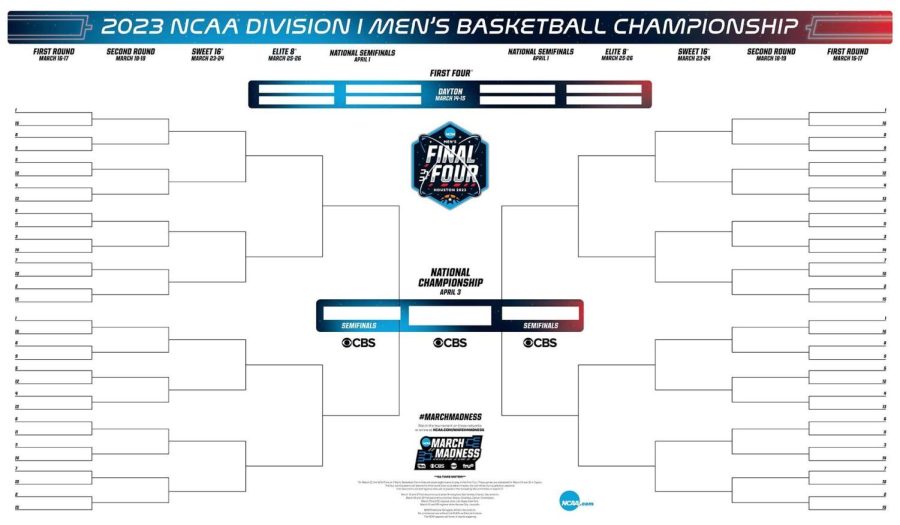March Madness for Dummies
A Simple Guide to the College Basketball Tournament of the Year
Perfect Predictions: A template of the 2023 March Madness Bracket, watchers can fill in the template with their predictions.
As the idea of my going away to college is becoming more and more of a reality, my mother is coming to terms with becoming an empty nester. Having declared she will need something to fill the void, she decided the next best thing to a house full of children is college basketball. For a woman who knows nothing about sports this is a bold statement. Along with this decision came a myriad of questions, some were quite valid, inquiring about the different college conferences, others seemed glaringly obvious, such as inquiring what March Madness actually was.
Originally I scoffed at these supposedly straightforward questions, but the more I thought about it I realized I also had no clue what March Madness actually was. After asking around I concluded my mother and I were not alone. When asked, many people did not know the logistics of what March Madness actually is. So consider this your guide: March Madness for dummies.
March Madness is a basketball tournament hosted by the National Collegiate Athletic Association, or NCAA. 68 men’s teams and 64 women’s teams battle for their respective national championship throughout the month of March.
The tournament begins March 14. On the Sunday before, dubbed Selection Sunday, the 32 teams who won their conference championships gained entry to the tournament. In addition, 36 men’s teams and 32 women’s teams are granted entry by a selection committee given what is called a bid.
After all teams have been selected, the tournament bracket, or the format for the tournament, is created and released, also on Selection Sunday.
The teams are divided into four regions, East, West, Midwest, and South. The bracket is created using seeds, or committee rankings. The 16 teams within each region are given a seed number 1-16, one being the best team and 16 being the worst.
These seed rankings tend to be extremely accurate, with the number 16 seed causing an upset and winning the tournament only once in March Madness history. The number one seeds tend to have a win percentage of about 80%.
For the majority of the tournament, teams play other teams in their region. The seed numbers help to determine who plays which team, for example in each region the number one seed and the number 16 seed play in the first round of the tournament. This process ensures that the tournament is fair and valid.
Once a team is declared the winner of their region, they enter the Final Four, in which the winners of the East and the West regions play each other and the winners of the South and Midwest play each other. The winners of those two games advance to the finals, where they play for the national championship.
The true popularity of this tournament lies not just in the actual games but in bracket predictions. Thousands of people around the nation create their predictions about who will win each game and create what they believe the bracket will look like. This has become a popular means of betting, where the person with the most accurate bracket wins money. Although this tournament has been played for the last 83 years, a perfect bracket that correctly predicts the outcome of every game has never been created.
Health teacher Mr. Jeffrey Raucci states, “I make a bracket every year because it is so much fun looking at and thinking through all the possibilities of teams that can survive and advance and see which teams come out on top. Also, a perfect bracket has never been created (until mine this year) so it is motivating to see if it will ever be done.”
Although Selection Sunday has not yet occurred, BIG 10 Network basketball analyst Andy Katz has released his selection and seed predictions. Katz places University of Alabama, Purdue University, University of Houston, and University of Texas as the number one seeds, and predicts they will win their respective conference championships.
Make sure to tune in and see if these predictions are accurate- my mother certainly will.
Your donation will support the student journalists of Foran High School. Your contribution will allow us to purchase equipment and cover our annual website hosting costs.

Hi, my name is Ginger Schmidt and I am a senior. This is my second year writing for the Mane Street Mirror. I am the captain of my school's gymnastics...







